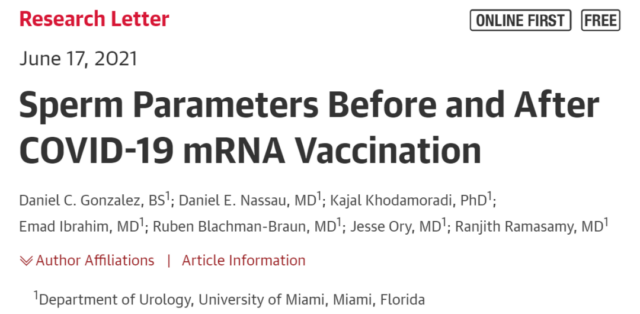Concentration and vitality of sperm increased after COVID-19 mRNA vaccine?
- Normal Liver Cells Found to Promote Cancer Metastasis to the Liver
- Nearly 80% Complete Remission: Breakthrough in ADC Anti-Tumor Treatment
- Vaccination Against Common Diseases May Prevent Dementia!
- New Alzheimer’s Disease (AD) Diagnosis and Staging Criteria
- Breakthrough in Alzheimer’s Disease: New Nasal Spray Halts Cognitive Decline by Targeting Toxic Protein
- Can the Tap Water at the Paris Olympics be Drunk Directly?
Concentration and vitality of sperm increased after COVID-19 mRNA vaccine?
Concentration and vitality of sperm increased after COVID-19 mRNA vaccine? JAMA: After being vaccinated with the COVID-19 mRNA vaccine, the concentration and vitality of male sperm increased?
At the end of 2020, the US FDA urgently authorized the use of the COVID-19 mRNA vaccine developed by Moderna and BioNTech/Pfizer. At present, these two mRNA vaccines have also become the most widely used new coronavirus vaccines worldwide.
Although large-scale clinical trials have shown that these two mRNA vaccines have strong protective effects and have very few side effects, according to surveys, only 56% of people in the United States are willing to receive mRNA vaccines. One of the reasons for the hesitation of vaccines in the United States is that people worry about their effects on fertility Ability may have potential negative effects.
The reproductive toxicity of mRNA vaccines has not been evaluated in previous clinical trials of mRNA vaccines. However, it has been determined that the new coronavirus can infect the male reproductive system and is related to the reduction of sperm parameters. Therefore, it is of great significance to evaluate the changes in sperm parameters before and after mRNA vaccination.
Recently, JAMA, one of the four major international medical journals, published an article from the Department of Urology, University of Miami, entitled: Sperm Parameters Before and After COVID-19 mRNA Vaccination.

The research team recruited healthy volunteers between the ages of 18-50 at the University of Miami by posting leaflets and internal school emails. These volunteers were vaccinated with the mRNA COVID-19 vaccine as planned. The study was approved by the University of Miami Institutional Review Board, and all participants received written informed consent.
First, these men are pre-screened to ensure that they have no potential fertility problems. Men who developed symptoms of COVID-19 disease or tested positive within 90 days were excluded. A total of 45 men met the criteria (median age 28 years).
Participants provided semen samples after 2 to 7 days of abstinence, and then received the first and second doses of mRNA vaccines, and then provided semen samples again 70 days later.
Then an experienced andrologist performs semen analysis in accordance with the guidelines of the World Health Organization (WHO), including semen volume, sperm concentration, sperm motility and total motile sperm count (TMSC). Sperm concentration below 15 million/mL is considered oligospermia.
Of the 45 men, 21 received the BioNTech/Pfizer mRNA vaccine, and 24 received the Moderna mRNA vaccine. The baseline sperm concentration and total motile sperm count (TMSC) were 26 million/mL and 36 million, respectively.
After the second dose of vaccine, the median sperm concentration increased significantly to 30 million/mL, and the median total motile sperm count (TMSC) increased significantly to 44 million. Semen volume and sperm motility also increased significantly.

Of the 45 men, 8 had oligospermia (median concentration of 8.5 million/mL) before receiving the mRNA vaccine. Among the 8 men, 7 men increased their sperm concentration to the normal sperm range (median concentration of 22 million/mL) after receiving the mRNA vaccine, and only 1 man still had oligospermia.
In general, in this comparative study of sperm parameters before and after 2 doses of COVID-19 mRNA vaccination, healthy men did not experience any decline in sperm parameters after vaccination. The author stated that the mRNA vaccine contains mRNA rather than live virus, so it is unlikely that the mRNA vaccine will affect sperm parameters.
But the author also said that the number of participants recruited in this study was small, and they were all young and healthy men, and the versatility of experimental results was limited. In addition, although semen analysis is the basis of male fertility assessment, it cannot be used as a perfect indicator of fertility. The author also stated that the experimental results show that all sperm parameters are significantly increased after vaccination, but the range of variation is also within the range of normal individual variation. The author of the paper finally stated that despite these imperfections, the events of this study have covered the entire life cycle of sperm.
(source:internet, reference only)
Disclaimer of medicaltrend.org
Important Note: The information provided is for informational purposes only and should not be considered as medical advice.



